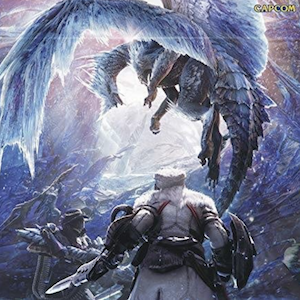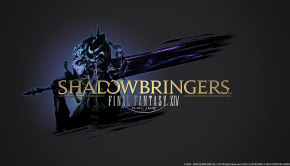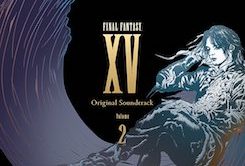Monster Hunter World: Iceborne
 |
Album Title: Monster Hunter World: Iceborne |
| Record Label: Suleputer | |
| Catalog No.: CPCA-10467~9 | |
| Release Date: September 25, 2019 | |
| Purchase: Buy on iTunes |
Overview
Few franchises please their player bases quite like Monster Hunter does. We’ve sung praises for its soundtracks in the past, but Monster Hunter’s real charm comes from its commitment to lavishing fresh content on players with each given entry, even long after that entry’s release.
Last year marked a turning point for the franchise, with Monster Hunter World receiving a full-on paid DLC expansion – the first of its kind in the series. That leaves us with a hefty haul of new musical content to cover. It’s no secret that we’re big fans of Monster Hunter World: Iceborne’s soundtrack, but let’s dive into the finer points of what made Monster Hunter World’s frosty follow-up such a strong contender for Best Orchestral / Cinematic Score of 2019.
Body
By now, Monster Hunter’s musical formula is set in stone. Listeners can expect a riveting main theme, an anchoring hub theme (and a handful of festive and jittery moments to go along with it), a couple of awe-inspiring area introduction themes, and, of course, ferocious battle tracks to accompany the larger-than-life monster hunts on which the franchise built its name. Take these ingredients, add masterful orchestration and diverse percussion, and you have a solid new Monster Hunter soundtrack on your hands.
Iceborne doesn’t stray from the formula, but it does tweak it according to the expansion’s frosty aesthetic. Just take the main theme, for example. In contrast to the rousing “Stars At Our Backs” from Monster Hunter World, Iceborne’s “Succession of Light” is a gentler and colder affair, introduced by way of a delicate piano solo. The theme warms up as the orchestra gets going, but even then the track is defined by elegance and fluidity rather than the sense of triumph that Monster Hunter’s main themes are typically known for.
Keeping true to the concept of Monster Hunter-meets-snow, Iceborne subtly yet deliberately employs wintery touches every so often. “Anomaly in the Forest” relies on rain sticks and hollow winds to create a chilling atmosphere. “The Frozen Continent’s Welcome” opens with a rich, rolling sound like an avalanche by day and a softer snowfall of celeste by night. “Hoarfrost Reach: Small Monsters Abound” is particularly unnerving, comprising stray celeste lines, a dissonant fluttering flute, wailing string descents, and abrupt staccato attacks. “Winter Star Soiree” touches on Hallmark levels of winter cheer, with infectiously sweet chord progressions and a liberal dose of sleigh bells. And where most Monster Hunter hub themes range from breezy to boastful in tone, “Theme of Seliana” instead opens with a solemn guitar and piano pairing and graduates to a heartstring-tugging waltz embroidered with tearful wind solos, eventually scaling back its orchestral components for a more upbeat and intimate mood.
To contrast the cold, Iceborne packs warm moments of levity. “Grammeowster Chef’s Warm Stew!” sells the swagger of its titular character with a syncopated melody ornamented with trickling flute and piano lines. “Steam at Our Backs!” calls steam engines to mind with its whistles and flutes and speeds ahead at a comical, rollicking pace. “Plastered in Pumpkins” revels in Halloween-ish tropes, tiptoeing between frantic and bombastic moments. And the two “Council Meeting” tracks – one plucky and brave, the other fraught with a sense of oncoming hardship and duty – do a decent job of firing up the listener for Monster Hunter’s epic fights.
For the most part, those epic monster fights amount to fittingly epic battle and chase themes. Monster Hunter fans may recognize a few of them from previous outings, albeit in updated forms. Not every update hits the mark: “The Voracious Deviljho” sounded less shrill and more threatening in Monster Hunter Tri. On the other hand, “The Beast Bares Its Fangs – Tigrex: World Version” translates just fine, with its syncopated staccato string swipes and brass punches intact. Compared to its Monster Hunter 4 form, “Brutish Indigo – Brachydios: World Version” feels like it received a substantial facelift, and comes across better balanced for it. And Iceborne’s “World’s End – Arch-Tempered Nergigante” successfully reworks Monster Hunter World’s previous Nergigante battle theme, faithfully recapturing the original’s flare and fervor.
The new monster themes are the real draw. “Roars Across the Hinterlands” makes a solid first impression with its rising and falling string runs, crystalline piano undercurrents, and a tambourine creating the impression of charging through a snowy forest. “Splendiferous Silver Sovereign Velkhana” reprises and enhances the bounding ear-worm of a theme from “Defense of Seliana” with majestic string writing and harp glissandi. “Morning Star of the Dark Tide: Namielle” comes across comparatively slow and lumbering, but maintains intrigue with a wormy synth bass, a persistent three-note chromatic assent and some dissonant piano and xylophone. And “Nay! The Honor is All Ours” incorporates both Monster Hunter World and Iceborne’s main themes for one of the soundtrack’s most melodic monster hunt themes.
Yet even “Nay! The Honor is All Ours” pales in comparison to two other moments on the soundtrack. The first evolves slowly across two “Monsters Abound” tracks for “The Guiding Lands”, in which elements from all across Monster Hunter World’s battle themes slowly emerge within a cavernous space. These elements culminate in “Congregation of the Fearless” – one of the most spirited, innovative and cinematic monster hunting themes in the series to date. (Celeste fans, see if you can spot a fragment of the “Reach for the Summit” melody in this one.)
The second moment concerns another suite of tracks, commonly titled “The Brilliance that Rules the Everstream – Kulve Taroth”. This theme, too, finds ways to freshen up the sound of Monster Hunter. In its “Confrontation” form, the theme comprises dynamic tempo shifts and sparkling pitched percussion. The subsequent “Transformation” form ditches the tempo shifts and adopts a domineering pipe organ. If that sounds un-Monster Hunter-like, just wait until you hear the “Tremor” form: blending choir, piano and pipe organ against a rich orchestral backdrop, the soundtrack could have passed for a Yoko Shimomura classic in the same vein as Final Fantasy XV.
The album wraps up with “Sapphire Star – World’s 1st Anniversary Commemorative Song” – but perhaps it shouldn’t have. It’s a dynamic, triumphant theme in its own right – and one that pays fun homage to Monster Hunter World’s “Stars at Our Backs” at that – but the track fades out in a fairly ambivalent manner. It’s a bit strange considering three tracks in the middle of the second disc would have concluded the album perfectly: “Songs of Triumph in the Winter Sky”, one of the more rousing victory themes the franchise has seen; “The Bird at Daybreak” an unprecedentedly delicate track with a wistful flute melody reminiscent of Okami’s tenderest moments; and “Tales Spun through Song”, an endearing and soulful sendoff by Monster Hunter’s mainstay vocalist Ikuko.
Summary
Iceborne won’t break the Monster Hunter mold, but in small ways it does manage to break new ground. Subtle instrumentation choices nail the theme of a frozen landscape and occasionally subvert established Monster Hunter norms in other ways. Meanwhile, the orchestration is as strong as ever, and the tracks satisfy series’s typical checklist. The result is an expansion soundtrack that both compliments Monster Hunter World and does just enough to stand apart from it.
Do you agree with the review and score? Let us know in the comments below!
4.5
Posted on March 13, 2020 by Reilly Farrell. Last modified on March 13, 2020.














